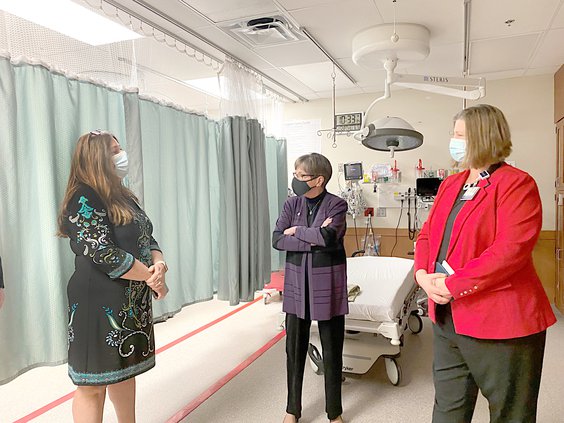During a visit to Great Bend on Thursday, Governor Laura Kelly said she has “about five billion reasons” why Kansas should expand Medicaid now.
Because Kansas has been one of the states not to expand Medicaid in recent years, “almost $5 billion (in federal funds) have been sent to other states,” Kelly said. “We need to make sure that our own dollars are coming back to Kansas.”
In 2017, Governor Sam Brownback vetoed a bill that would have expanded Medicaid to cover 150,000 low-income Kansans. Since then, the Legislature has been unable to get a Medicaid expansion bill through, even when it appeared to have support from the majority of both parties.
“It’s really inconceivable to me that the Legislature still stands in the way – Legislature leadership – it’s not the entire Legislature. The Legislature actually voted for Medicaid but it’s leadership that is preventing the Legislature from taking votes on Medicaid expansion.”
The nearly $5 billion in taxpayer money that could have come to Kansas has been dispersed to other states, but that’s not all, she said.
“Right now there’s an incentive in the (federal) Rescue Plan that would bring $350 million to $450 million to Kansas over the next two years, IF we expand Medicaid. We absolutely have to expand Medicaid in order to get those dollars.”
Good for economic development
Kelly said there never was a good reason for the state not to expand Medicaid. Now the Kansas Health Institute has released a report indicating business owners could save money if Medicaid is expanded.
“We’ve known this, but it’s good to have the study done to provide facts and the data to back this up,” Kelly said. “By having Medicaid expanded we will actually lower the health-care costs for employers because many of their employees will be able to get their insurance through Medicaid, versus the employer having to provide out-of-pocket for that. And I think the underlying thing goes back to the idea that they’ll have a healthier workforce, so they’re going to be more productive and that’s going to help the businesses’ bottom line.”
Medical marijuana could finance it
Asked if she had a specific plan to get Medicaid expansion passed, Kelly said she’s had several, dating back to the time it passed and was vetoed by Governor Brownback.
“When I got into office, we have now, three times, offered strategies for expanding Medicaid. Last year, for instance, I worked out a bipartisan arrangement with the then-majority leader in the Kansas Senate, where we came together and crafted what ended up being a model for other states on the expansion, but we were blocked by other legislative leadership who would not allow it to come to the floor for a vote.”
This year, Kelly tried to take another approach.
“The argument we always hear is that Kansas can’t afford it. I would argue we can’t afford not to. But if that’s the argument then what I did was I paired Medicaid expansion with medical marijuana. The proceeds from medical marijuana could be used to offset the purported costs for Medicaid expansion.”
Kansans urged to get COVID-19 vaccinations
Kelly visited the University of Kansas Health System - Great Bend Campus on Thursday as part of her “Back to Work, Back to School” tour. Kelly also urged Kansans to get vaccinated.
This week, 62 Kansas counties – including Barton County – turned down new allocations of COVID-19 vaccine as the demand for doses has decreased. Only about 37% of all Kansans have received at least one dose of vaccine.
“My concern is that as a state we have not reached that herd immunity, which is around 70% of the population having been vaccinated. We need to reach that if we’re ever going to be able to go back to work, go back to school in a normal fashion. So we really encourage local folks to have conversations with people and encourage them to get vaccinated. There is plenty of vaccine available in most places now – you don’t even have to make an appointment (in some cases).
“I know there’s a sense that we’re past it, but that is not true. In fact, right now in Kansas, we have too many outbreaks of those new variants that are coming in,” Kelly continued. “Some are coming in from South America, some are coming in from United Kingdom; the latest ones are coming in from California. I don’t believe they’ve gotten to the rural areas so much, but we’re seeing them and we just need to be careful.”
Next up: Education
The Legislature is on its routine April break, Kelly said, which is why she is taking the opportunity to travel across the state – focusing this week on health care. Last week, the governor’s tour was focused on economic development and next week’s focus will be education.





